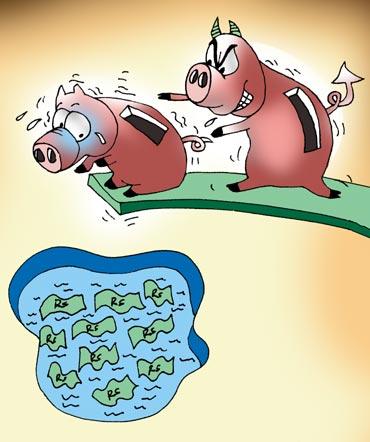
Experts suggest 6 ways to play stocks that tank suddenly and make money.
Sanjay Kumar Singh listens in.
Illustration: Uttam Ghosh/Rediff.com
When the price of a stock falls sharply on a single day, the immediate impulse is to exit
On July 18, ITC shares fell 13 per cent after the Goods and Services Tax Council decided to increase the cess on cigarettes.
Often, when a stock witnesses a big decline within a day, a herd mentality sets in and investors stampede towards the exit.
Experts suggest that in such situations, investors take some time to weigh the prospects of the underlying business and then come up with a measured response.
1. Avoid the impulse to sell
When there is a steep fall in the price of a stock, many small investors get jittery and feel they have suffered an irretrievable loss.
Experts say this happens because most investors don't do their own fundamental analysis. They invest on others' recommendations.
"If you buy after doing proper research, you will have confidence in your picks. If you buy a stock at Rs 100 and feel it is a good price, you should feel better about purchasing more of it when the price goes down to Rs 90," says S G Raja Sekharan who teaches wealth management at Bengaluru's Christ University and an avid investor.
Other experts agree. "Unless you are a trader, in which case you have a pre-set stop-loss, price movement alone should not trigger a sell decision. The intrinsic value of the underlying business should drive all buy and sell decisions," says Jatin Khemani, founder and chief executive officer of the Delhi-based Stalwart Advisors, a Sebi-registered independent equity research firm.
2. Dig deeper
Whenever a stock witnesses a steep fall, the key is to investigate further.
"The retail (small) investor must find the reason for the fall in stock price before deciding to retain or sell it," says Anand Shah, deputy chief executive officer and chief investment officer, BNP Paribas Mutual Fund.
An investor who bought a stock for the long term would have a thesis (a reason) for making the purchase.
He needs to revisit it to see if it is still intact. Take the case of ITC.
Any investor who bought the stock after doing due diligence would be aware that regulatory risk is an intrinsic part of the business. S/he would perhaps also have studied what happens each time the government increases its levy on this business.
S/he needs to check if things will be different this time.
"The investor needs to take a call on whether this is a temporary issue and if the company can tide over it. If the conclusion is yes, s/he should not sell the stock," says Vinod M S, head of direct equity, Mitraz Financial Services.
3. When to hold on
Sometimes an event might appear very negative initially.
A careful examination could, however, indicate that the long-term impact would not be so dire after all.
Take the instance of the US Food and Drug Administration issuing an import alert for products made at Divi's Laboratories' Visakhapatnam plant in March.
"Anyone who studied the business carefully would realise only a small percentage of their US revenue would be at risk, given that the USFDA had given exemptions from the import alert to many key products from the same units," says Vinod.
In such cases, the investor is better off ignoring the negative development.
4. When a fall spells an opportunity
Sometimes, certain macro events generate so much fear and panic that they drive the entire markets, including quality stocks, down.
In the aftermath of demonetisation, many high-quality consumption oriented stocks corrected by 20 per cent or more, though the impact on most was going to be only temporary.
As soon as the shortage of currency notes ended, it would be business as usual for these players.
Any value-oriented investor could have, and many did, benefit from the temporary price decline caused by this development.
To cite another example, in October 2015, DCB Bank announced it would double its branch network over the next two years.
Its stock crashed from Rs 140 to Rs 90 within two days and eventually to Rs 70.
"While this development was going to punish near-term earnings, it was very positive for the long-term growth and sustainability of the business, making the stock a great buying opportunity," says Khemani.
The stock has since given 185 per cent return.
5. When you should exit
Sometimes, the price of a stock declines due to factors that are long-term in nature.
"Your investigation could reveal structural problems in the sector or company, which may have impaired its prospects for the long term. In such cases, the investor is better off exiting the stock," says Shah.
For instance, many pharmaceutical companies have found it difficult to bounce back from the blow dealt to them by USFDA actions.
Stiff competition within telecom and the inability of Indian information technology companies to make a timely transition to newer technologies are structural issues.
Investors should also exit post-haste in case of corporate governance issues, like fraud by a promoter or director.
6. Curtail losses
While it is usually a good idea to buy more of a stock whose price has fallen due to temporary reasons, investors also need to watch for the risk of over-exposure.
One way you can do this is by limiting the allocation to each stock in your portfolio.
"Once you have decided on, say, a 5 per cent allocation, do not invest more in the stock even if its price declines further," says Raja Sekharan.
Having a fixed allocation curtails risk. Sekharan recounted the case of an investor who lost Rs 33 lakh in a single stock.
He kept buying more of it even as its price fell, believing that by doing so, he was reducing his average purchase price.
Eventually, the company closed down and he lost his entire investment.
Having a limited allocation to each stock comes handy in such instances when an investor's judgment about a stock is completely off the mark.













 © 2025
© 2025